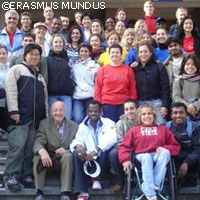EU launches bigger better higher education programme
The European Commission has adopted a proposal to renew its higher education programme, Erasmus Mundus, for the period 2009-2013. The new programme, Erasmus Mundus II, will receive just over €950 million over five years to enable joint programmes or collaborative partnerships between the European Union and 'third country' universities, and to grant scholarships to EU and third country students for an international study experience. The current Erasmus Mundus programme was started in 2004 as a co-operation and mobility programme in post-graduate higher education. Its aim is to promote European higher education as a centre of excellence in learning around the world. By 2006, more than 2,300 students had participated in the programme; a further 1,800 have just been selected to start their studies in Europe in September. 'The current Erasmus Mundus programme has been successfully running since its launch in 2004, encouraging the creation of high-quality Masters courses in Europe and attracting high-calibre students from third countries to European universities,' said European Commissioner for Education, Training, Culture and Youth, Ján Figel'. 'While we must consolidate the encouraging achievements of the current programme, we also feel that it is necessary to go a step further and widen the scope of the programme so that Erasmus Mundus becomes the trademark for EU cooperation with third countries in the field of higher education,' the Commissioner added. Erasmus Mundus II will extend the current programme by covering a whole range of new activities. These will include joint doctoral programmes, increased financial support for European students, as well as collaborative partnerships with specific world regions. 'With Erasmus Mundus II we now want to exploit the full potential of cooperation between European and third-country universities worldwide: The new programme will extend its scope of activities in terms of participants, higher education programmes on offer and scholarships,' commented EU External Relations Commissioner Benita Ferrero-Waldner. The European Commission will now negotiate the proposal with the Council and the European Parliament. The Commission hopes that the new programme could be adopted by 2008 and come into force in January 2009 at which time the current programme expires.



